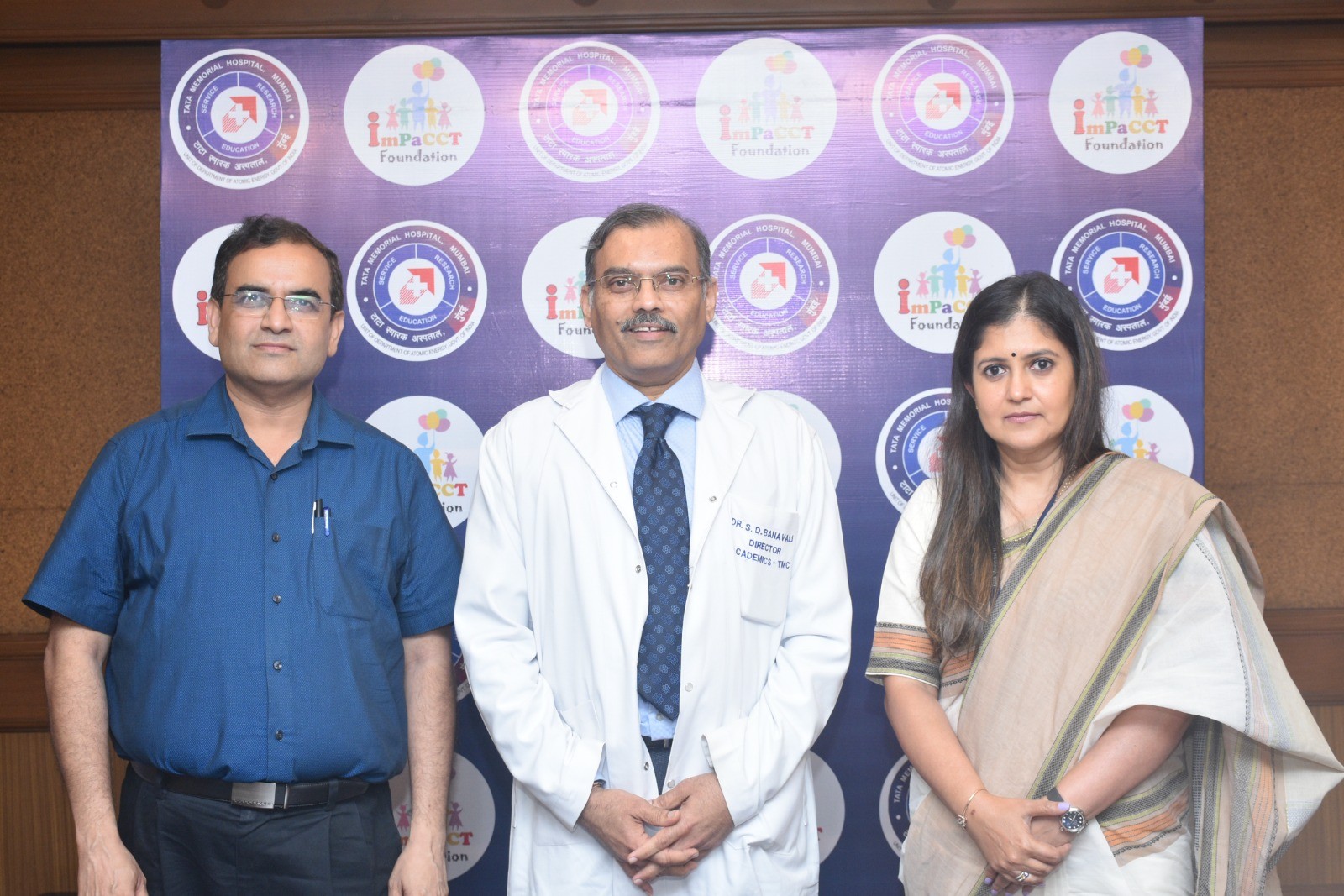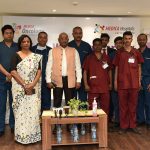ImPaCCT Foundation, Tata Memorial Centre, hosted a press conference today at the hospital, addressing crucial aspects of Paediatric Cancer Care in India. Speaking at the event were, Ms. Shalini Jatia (Officer-in-Charge, ImPaCCT Foundation, Tata Memorial Centre), Dr. Shripad Banavali (Director, Academics, Tata Memorial Centre) and Dr. Girish Chinnaswamy (Head of Department, Paediatric Medical Oncology, Tata Memorial Hospital).
The esteemed speakers explored pivotal talk points such as Pediatric Care, unveiling enlightening statistics on patients, facilities, treatments, cure rates and recent breakthroughs. Addressing the prevalent challenges in Pediatric Cancer Care in India, they articulated a Survivorship Program tailored to facilitate the seamless reintegration of young survivors into their everyday lives.
The press conference highlighted collaborative efforts and support initiatives aimed at fostering a cultivating environment for effective treatment and care. The experts shed light on advancements in multimodality therapy, with a particular emphasis on the pivotal role of Immunotherapy in improving treatment outcomes. A noteworthy highlight of the event was the official announcement of the forthcoming annual cultural event – HOPE 2023, the biggest annual cultural event hosted by ImPaCCT Foundation, Tata Memorial Hospital for Pediatric Cancer Patients.
HOPE 2023, curated by ImPaCCT Foundation, Tata Memorial Centre, is committed to supporting pediatric cancer care. Embracing the lively essence of Bollywood, this year’s theme ensures spreading laughter resembling The Kapil Sharma Show. The spotlight will be on children as they showcase their unique interpretation of the comedia, injecting the event with laughter and entertainment.
Below are the statistics and highlights from the Press Conference:
Dr. Shripad Banavali (Director, Academics, Tata Memorial Centre):
- Delivery and advancement in multi-modality therapy including Immunotherapy
- Initiation of newer therapies for high-risk pediatric cancers
- Immunotherapy for Leukemia, neuroblastoma
- Blinatumomab therapy provided on an access program supported by St. Jude Children’s Hospital USA. About 30 children benefited from this program. This is a therapy to treat difficult leukemia
- CAR T cell therapy undergoing clinical trials in children
- Newer targeted therapy for brain tumors, neuroblastoma
- To improve outcomes and decrease toxicity
- Liver transplant service started with collaboration
Dr. Girish Chinnaswamy (Head of Department, Paediatric Medical Oncology, Tata Memorial Hospital):
- Childhood cancer research initiatives
- Numerous multicenter trials started in the country
- National cancer grid support
- TMC actively leading and participating in trials (Hodgkin Lymphoma, Leukemia trials, etc.)
- Malnutrition and cancer
- Collaborations to improve childhood cancer outcomes
- WHO GICC
- Jude Global Alliance
- Working on a global initiative for improving childhood cancer survival to 60%
Ms. Shalini Jatia (Officer-in-Charge, ImPaCCT Foundation, Tata Memorial Centre):
- Few facts and figures on childhood cancer
- India accounts for 20% of the new childhood cancer cases diagnosed worldwide each year. As India has approx. 70000 cases (less than 18 years) and worldwide approx. 400,000
- In TMC centres alone nearly 3500 cases are being seen every year annually
- Childhood cancer cure rates are actually 70 to 95% in high income countries. In India the average survival rates are approx. 40%. global cure rates of childhood cancers are 35%
- Childhood cancer services over a decade and our survival outcomes
- ImPaCCT – set up in 2010 – registrations in 12 years
- Components of holistic support model
- Additional support staff to improve the quality of care
- Development of a database
- Analysis of the data – long term survival outcomes
- 80% of the children coming to TMC are treated in the general category
- Set up ImPaCCT in 2010 – abandonment rates were extremely high – 25%
- This necessitated the development of a robust database for monitoring the implementation of the program and the impact assessment
- Captured data over 12 years – demographics, socio-economic factors, treatment abandonment, survival outcomes, survivorship
- Data is entered via a google sheet by all members of the multi-disciplinary team
- Also used for tracking the patients during and post therapy
- We have recently analysed the database of the past 12 years
- Survivorship program – reintegration into society
- of survivors registered in ACT – ACT clinic started on the 5th of February, 1991. Until date we have 4634 patients registered
- Survivorship support program – components of support – financial, psychosocial, educational, vocational, – all crucial to our population of survivors
- Details of the education program – initiated in 2016, until date supported 662 patients with funding to the tune of Rs. 1.5 crores (1,50,48,055)
- Full circle of life – treatment, survivorship, reintegration, giving back to the hospital – Anamika Soni, Arun Nadar. Other survivors who are doing very well professionally are sports, computer application, engineering






